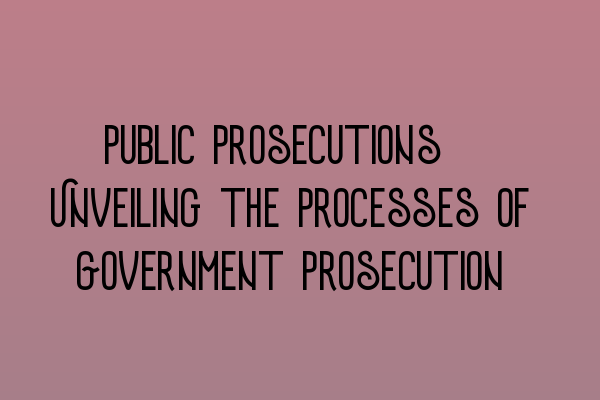Public Prosecutions: Unveiling the Processes of Government Prosecution
Welcome to our blog post that delves into the intricate processes of government prosecution in the UK. At SQE Criminal Law & Practice Law UK, it is crucial for us to shed light on the mechanisms involved in public prosecutions and provide a comprehensive understanding to our readers.
The Role of Government Prosecution
The role of government prosecution is a fundamental pillar of the criminal justice system. It involves representing the interests of the state by initiating legal proceedings against individuals or entities accused of committing a crime. Government prosecutors, also known as Crown Prosecutors, play a vital role in upholding the rule of law and ensuring justice is served.
Effective government prosecution requires a thorough understanding of the law, meticulous case preparation, and the ability to present evidence convincingly in court. As legal professionals, it is essential to be well-versed in the principles and procedures associated with public prosecutions to ensure fair and just outcomes.
The Processes Involved in Government Prosecution
Government prosecutions typically involve the following stages:
- Investigation: Prior to initiating legal proceedings, government prosecutors collaborate with law enforcement agencies to investigate alleged criminal activities. This stage involves gathering evidence, interviewing witnesses, and examining the facts surrounding the case. For a comprehensive guide on preparing for investigations, check out our article on SQE 1 Practice Exam Questions.
- Charging Decision: Once the investigation is complete, government prosecutors assess the evidence to determine whether it is sufficient to support criminal charges. This decision-making process, known as a charging decision, requires a careful evaluation of the available evidence, legal principles, and the public interest. Practice your decision-making skills with our SQE 1 Practice Mocks FLK1 FLK2.
- Court Proceedings: If charges are filed, the case proceeds to court. Government prosecutors represent the state by presenting the evidence against the accused, examining witnesses, and cross-examining the defense’s witnesses. Staying well-prepared and having a solid understanding of courtroom procedures is crucial for success. Enroll in our SQE 2 Preparation Courses to enhance your courtroom advocacy skills.
- Legal Arguments: During court proceedings, government prosecutors and defense attorneys present legal arguments to support their respective positions. These arguments are based on legal principles, precedents, and the facts of the case. Properly structuring and presenting persuasive legal arguments is a valuable skill for any prosecutor. Learn more about effective legal arguments in our article on SQE 1 Preparation Courses.
- Judgment and Sentencing: Following the presentation of the evidence and legal arguments, the judge or jury determines the guilt or innocence of the accused. If the accused is found guilty, the judge then presides over the sentencing process. Sentencing can include various penalties, such as fines, imprisonment, community service, or probation. Stay updated on the latest SRA SQE Exam Dates to ensure you are well-prepared for these crucial stages.
We hope this article has provided you with valuable insights into the processes involved in government prosecution. At SQE Criminal Law & Practice Law UK, we are committed to equipping legal professionals with the knowledge and skills necessary for a successful career in criminal law. Stay tuned for more informative content!
